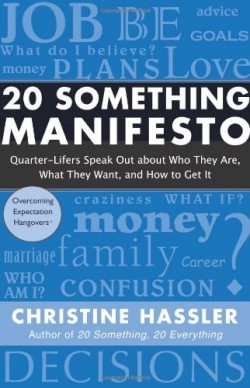20 Something Manifesto
Quarter-Lifers Speak Out about Who They Are, What They Want, and How to Get It
Mid-life crises are fairly well-known in these days of too many choices and too little time. Quarter-life crises are perhaps less talked about, but just as significant, according to author Christine Hassler. Hassler, a life coach and inspirational speaker with six years of experience studying the third decade of life, maintains that “twenty somethings” are also subject to a bevy of insecurities and discontents that may affect the rest of their lives, and most of them can’t afford the sports car band-aid.
In 20 Something Manifesto*, Hassler explores the different issues that people in their twenties face, such as career uncertainty, relationship challenges, and identity anxiety, all of which may result in what she calls an “Expectation Hangover.” She defines an Expectation Hangover as that feeling of disappointment and bewilderment that descends when circumstances, emotions, and relationships fail to follow an expected path.
Her greatest strength lies in the claim that periods of anxiety and depression are normal for this age group. While she often advises readers to seek counseling or therapy if they feel desperate, she also gives the impression that these bumps and bruises are all an integral part of becoming a full-fledged adult. She uses her own experiences as very effective examples; having weathered a broken engagement and several career changes, Hassler is able to look back and point out where her thinking and behavior led to feelings of failure and inadequacy, and how by changing her attitude she created a life pattern she was happy with.
In addition to telling her own tale, Hassler includes personal stories by other twenty-somethings on subjects such as getting divorced, deciding to leave lucrative careers, and developing love for parents who made many mistakes. While the book is geared toward those in their third decade, people of many ages will find familiar scenarios. Mid-life or quarter-life crisis, the issues are reflective of the human desire to understand ourselves, a task Hassler is here to help with.
Reviewed by
Andi Diehn
Disclosure: This article is not an endorsement, but a review. The publisher of this book provided free copies of the book to have their book reviewed by a professional reviewer. No fee was paid by the publisher for this review. Foreword Reviews only recommends books that we love. Foreword Magazine, Inc. is disclosing this in accordance with the Federal Trade Commission’s 16 CFR, Part 255.

